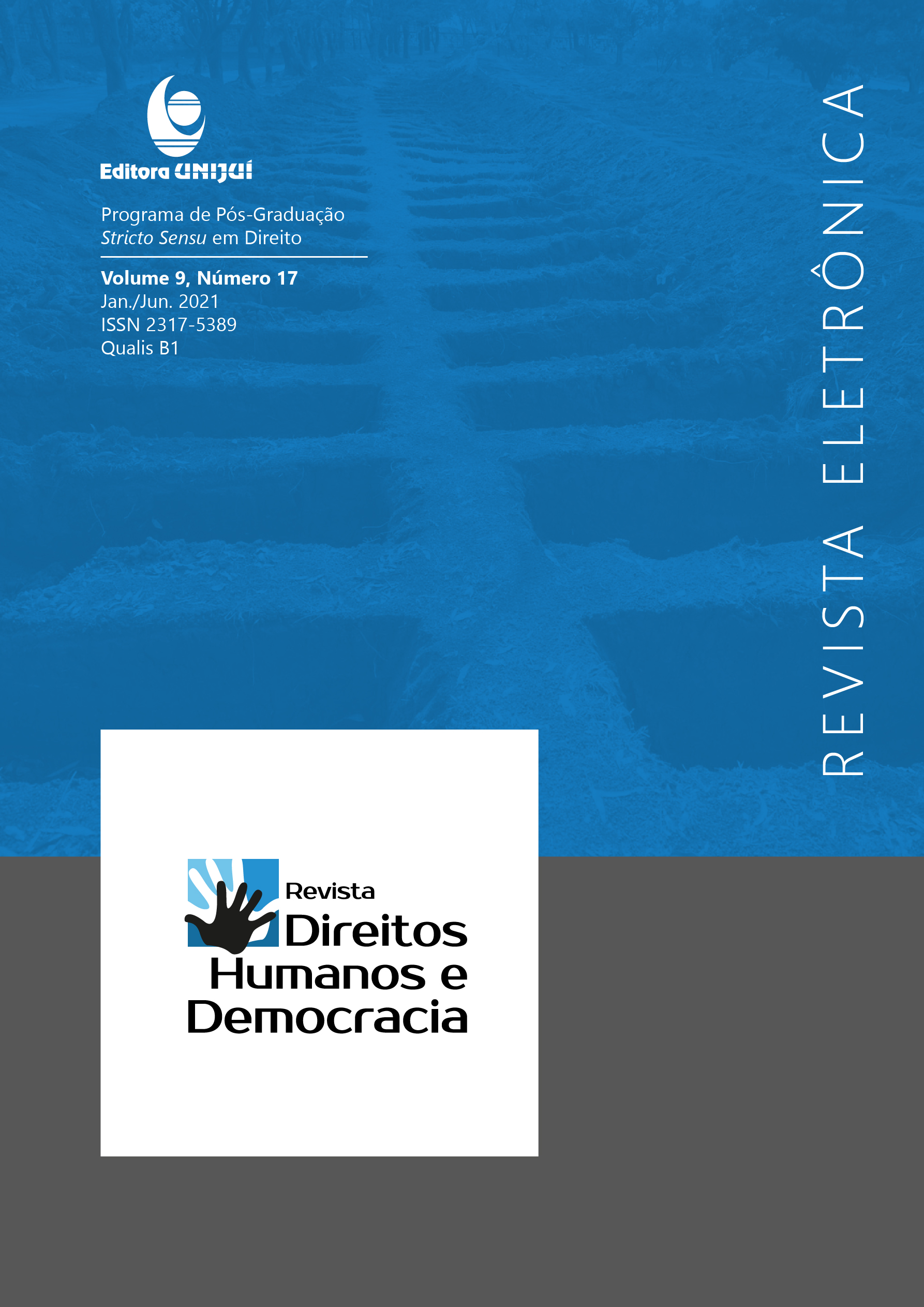PODER DE FATO E PODER DE DIREITO NO EXERCÍCIO DA SOBERANIA POPULAR: DA VONTADE GERAL COMO CONDIÇÃO PARA A INSTAURAÇÃO DA DEMOCRACIA PARTICIPATIVA
POWER OF FACT AND POWER OF LAW IN THE EXERCISE OF POPULAR SOVEREIGNTY: OF THE GENERAL WILL AS CONDITION FOR THE INSTAURATION OF PARTICIPATIVE DEMOCRACY
DOI:
https://doi.org/10.21527/2317-5389.2021.17.9069Palavras-chave:
Vontade Geral; Soberania Popular; Estado; Direito; Democracia Participativa.Resumo
Baseada na teoria de Rousseau, a pesquisa assinala que, consistindo na condição sine qua non para o exercício da
soberania popular em uma construção que converge para as fronteiras que encerram a Constituição e o Estado, a
Vontade Geral envolve a possibilidade de articulação da totalidade dos homens na condição de indivíduos em sua
concreticidade histórico-cultural e econômico-social, o que implica a universalidade concreta, que advém do conjunto
de vontades e fato econômico que caracteriza a sociedade e a dinâmica das relações intersubjetivas. Dessa
forma, fundamentado em uma pesquisa bibliográfica, o artigo dialoga com a perspectiva da teoria institucional de
Castoriadis, Lapassade e Lourau, defendendo que, caracterizando-se como um processo ético-jurídico de deliberação
coletiva que implica a objetivação dos valores, necessidades e fins do povo como corpo coletivo e moral por
meio de um movimento econômico-político que envolve os momentos que encerram o instituído, o instituinte e a
institucionalização, a Vontade Geral converte o conteúdo político-social em poder de direito. Assim sendo, convergindo
para a superação da universalidade de um Direito que encerra um “dever-ser” e uma exterioridade coercitiva
que se impõe em nome do bem comum da totalidade político-jurídica e econômico-social do Estado, a pesquisa
mostra que a Vontade Geral se sobrepõe à ruptura que, envolvendo a ordem jurídica e a ordem social, caracteriza a
instituição estatal sob a égide do liberalismo, possibilitando a instauração da democracia participativa.
Downloads
Publicado
Como Citar
Edição
Seção
Licença
Ao publicar na Revista Direitos Humanos e Democracia, os autores concordam com os seguintes termos:
Os trabalhos seguem a licença Creative Commons Atribuição 4.0 Internacional (CC BY 4.0), que permite:
Compartilhar — copiar e redistribuir o material em qualquer meio ou formato;
Adaptar — remixar, transformar e criar a partir do material para qualquer fim, inclusive comercial.
Essas permissões são irrevogáveis, desde que respeitados os seguintes termos:
Atribuição — os autores devem ser devidamente creditados, com link para a licença e indicação de eventuais alterações realizadas.
Sem restrições adicionais — não podem ser aplicadas condições legais ou tecnológicas que restrinjam o uso permitido pela licença.
Avisos:
A licença não se aplica a elementos em domínio público ou cobertos por exceções legais.
A licença não garante todos os direitos necessários para usos específicos (ex.: direitos de imagem, privacidade ou morais).
A revista não se responsabiliza pelas opiniões expressas nos artigos, que são de exclusiva responsabilidade dos autores. O Editor, com o apoio do Comitê Editorial, reserva-se o direito de sugerir ou solicitar modificações quando necessário.
Somente serão aceitos artigos científicos originais, com resultados de pesquisas de interesse que não tenham sido publicados nem submetidos simultaneamente a outro periódico com o mesmo objetivo.
A menção a marcas comerciais ou produtos específicos destina-se apenas à identificação, sem qualquer vínculo promocional por parte dos autores ou da revista.
Contrato de Licença: Os autores mantém os direitos autorais sobre seu artigo, e concedem a Revista Direitos Humanos e Democracia o direito de primeira publicação.













